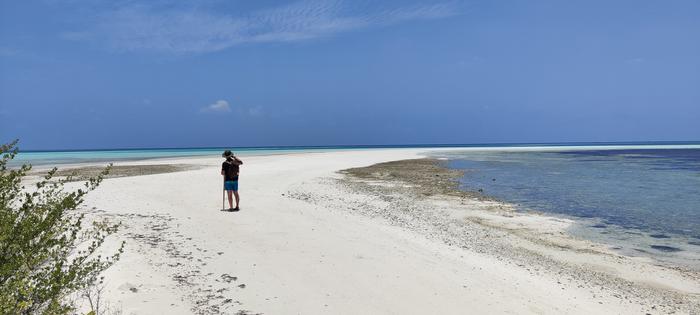Scientists have produced the first detailed estimates of how much sediment is transported onto the shores of coral reef islands, and how that might enable them to withstand the future threats posed by climate change.

Credit: University of Plymouth
Scientists have produced the first detailed estimates of how much sediment is transported onto the shores of coral reef islands, and how that might enable them to withstand the future threats posed by climate change.
Coral reef islands are low-lying accumulations of sand and gravel-sized sediment deposited on coral reef surfaces.
The sediments are derived from the broken down remains of corals and other organisms that grow on the surrounding reef. Therefore, the rate of supply of sediment from reefs is a critical control on island formation and future change.
The international team of researchers used data available for 28 reef islands in the Indian and Pacific Oceans, widely acknowledged to be among the world’s most vulnerable environments to rising seas.
By identifying the amount of sediment present within reef islands, and comparing this against the known age of the islands, they were able to determine the average amount of sediment delivered to the islands from surrounding coral reefs over their histories.
They discovered that on average, for every metre of shoreline, around 0.1m3 (equivalent to around 100kg) of sediment is delivered to the islands per year.
It means that for an island with a perimeter of around 2000m, just over 300 dumpy bags of reef-derived sediment are added to the island each year.
They also estimated that only a quarter of the sediment generated on reef surfaces actually reaches the island shoreline and is used for island-building, with the remainder staying within its reefs, or being transported into the ocean or lagoon.
Writing in Geophysical Research Letters, the study’s authors say their findings could go some way to explaining a global observation that most of these islands have grown over the past few decades.
This is in spite of the perception that rising sea levels might erode their shorelines, and disregards artificial island expansion created by local populations.
The research was carried out by experts from the University of Plymouth and National University of Singapore, who have collaborated for many years to examine the threats posed to coastal communities by climate change.
They have previously published research suggesting that so-called island ‘drowning’, whereby remote islands will be flooded as sea levels rise, is not inevitable.
Professor Gerd Masselink, Professor of Coastal Geomorphology at the University of Plymouth, led the study. He said: “These results will help us to predict more accurately how coral reef islands will adjust to sea-level rise. The conventional thinking is that these islands will drown over the next century as the effects of climate change are felt more strongly, but an alternative view is that enhanced flooding due to sea-level rise can help raise the island elevation. The ability of reef islands to naturally adapt to sea-level rise by raising their elevation critically depends on how much sediment they receive each year from the living coral reef system.”
Study co-author Professor Paul Kench, Professor of Tropical Coastal Change from the Department of Geography at the National University of Singapore, has investigated reef island dynamics and evolution for over three decades. He added: “Sediment generation and supply to islands is one of the critical controls on how islands have formed in the past, but also how they will continue to change with rising sea levels. Rates of sediment supply to islands are poorly understood. This research provides an important development in establishing long-term rates of sediment delivery to islands that will support their ongoing adjustment to changing environmental conditions.”
The new study is the first to be produced through the ARISE programme, a £2.8 million initiative being funded UK Research and Innovation’s Horizon Europe Guarantee programme.
The five-year project will include a series of extensive field tests – using state-of-the art coastal process research instrumentation and autonomous survey equipment – in both the Maldives and the Pacific between now and 2027.
There will also be laboratory experiments in the largest wave flume in the world – the Delta Flume at Deltares in the Netherlands – and combined, these tests will enable researchers to explore the impact of overwashing on the islands’ beaches and any natural processes that are adding to their resilience.
The researchers also aim to work with communities and government bodies in the atoll island nations, enabling them to implement adaptation strategies that maximise opportunities for continued habitation.
Journal
Geophysical Research Letters
DOI
10.1029/2023GL105610
Method of Research
Meta-analysis
Subject of Research
Not applicable
Article Title
Meta-Study of Carbonate Sediment Delivery Rates to Indo-Pacific Coral Reef Islands
Article Publication Date
24-Feb-2024




